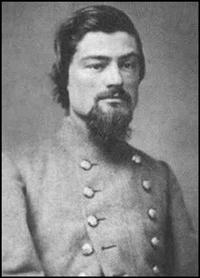Preparing For War
 |
 |
At the beginning of 1861 in Missouri, it was clear that Claiborne Jackson and Frank Blair would be the leaders of opposing factions in the State of Missouri. In St. Louis, Missouri, both sides were forming paramilitary organizations in preparation for war. At the beginning of 1861, it was fair to classify three kinds of Missourians:

Secessionist – Men like Claiborne Jackson who believed with all their heart that Missouri belonged in the Confederacy.
Conditional Unionist – Men like Sterling Price who wanted Missouri to stay part of the United States. But did not believe that the United States was right to forcibly prevent a State from seceding. These were the vast majority of Missourians at the beginning of 1861.
Unconditional Unionist – Men like Frank Blair who believed the United States could use any means necessary to prevent States from seceding. They believed with all their heart that secession was treason against the country.
The Minute Men

Basil Duke, Colton Greene, and other Southerner leaders in St. Louis wanted Governor Jackson to move quickly and lead Missouri into the Confederacy. In reaction to what they felt was indecisiveness and to counter Blair's Wide Awakes, they met on January 7th to form a paramilitary organization that they called the Minute Men. [16]
The Minute Men established their headquarters at the Berthold Mansion at the northwest corner of Fifth and Pine Streets in St. Louis. [17]
Two leaders of the Minute Men were Basil Duke and Colton Greene. Basil Duke had been born in Kentucky and was a Conditional Unionist until Federal troops had been sent into St. Louis to guard the Arsenal. Colton Greene had been born in South Carolina and was an avowed secessionist. Both men would work closely with Governor Claiborne Jackson. [18]
According to Basil Duke: [19]
The chief and primary object of [The Minute Men] was the capture of the [Saint Louis] arsenal. We were handicapped, however, not only by the scruples and remonstrances of the older and more conservative men, but by the difficulty of procuring arms.
The Union Guard
In 1860 Frank Blair had formed a paramilitary organization called the Wide Awakes to provide protection from mobs that tried to disrupt Republican political meetings during the campaign of 1860[20]

In January 1861, Blair was concerned about the pro-Southern Minute Men and decided that the Wide Awakes needed to be reorganized into pro-Union clubs. In a meeting at Washington Hall on January 11th, the Wide Awakes were formally disbanded and replaced by the Union (or Home) Guard. [21]
The members of the Wide Awakes enrolled into military-style companies and began to drill at night in various location throughout the city. Frank Blair would serve as the Colonel of the Union Guard. Franz Sigel, a German-American who had commanded an army in the German Revolution of 1848, would conduct military training drills with the Union Guard in St. Louis.[22]
The Safety Committee of St. Louis

Having been elected to Congress, Frank Blair knew he would need to be in Washington from time to time. He collaborated with some of his colleagues to protect the political interests of Unconditional Unionists in St. Louis. In an early February meeting at Washington Hall, the Safety Committee was established with the following membership: Francis P. Blair, Jr., O. D. Filley, John How, Samuel T. Glover, James O. Broadhead, and J. J. Witzig.[23]
Back: The 1860 Elections
Next: Forest Park in St. Louis, Missouri
